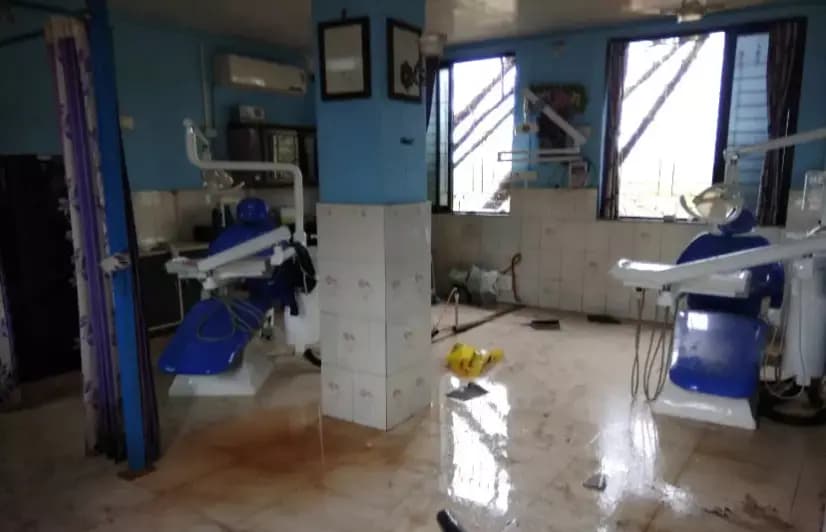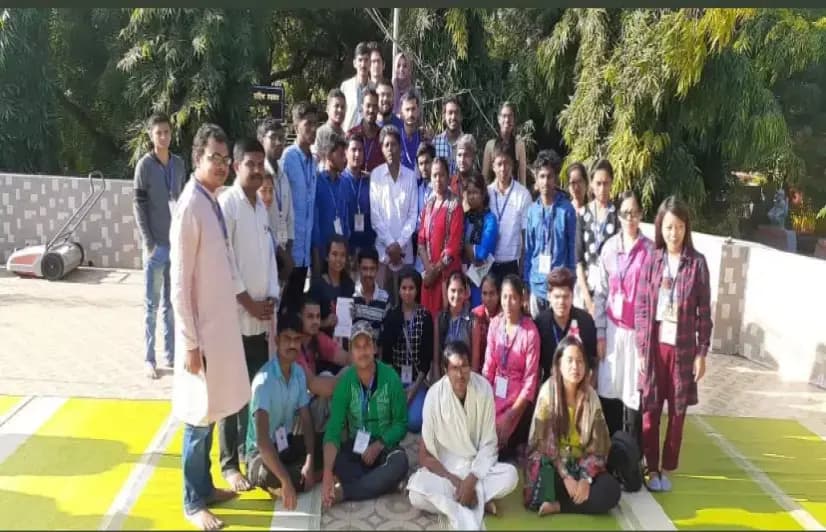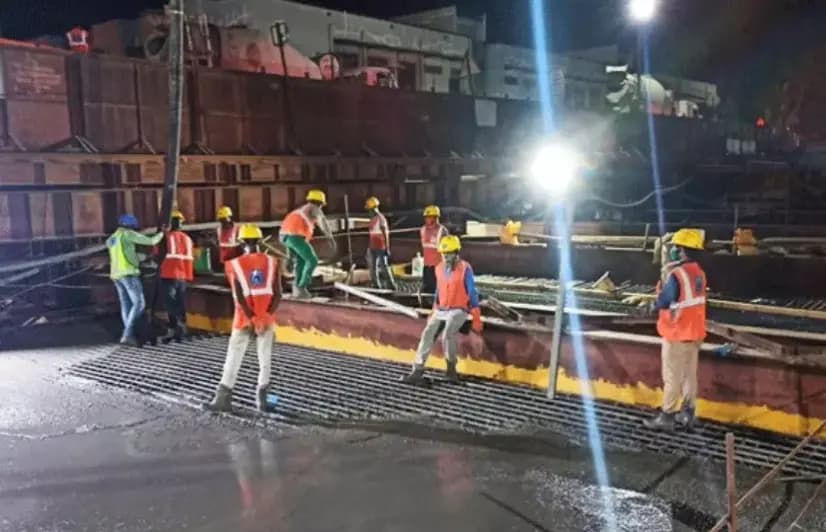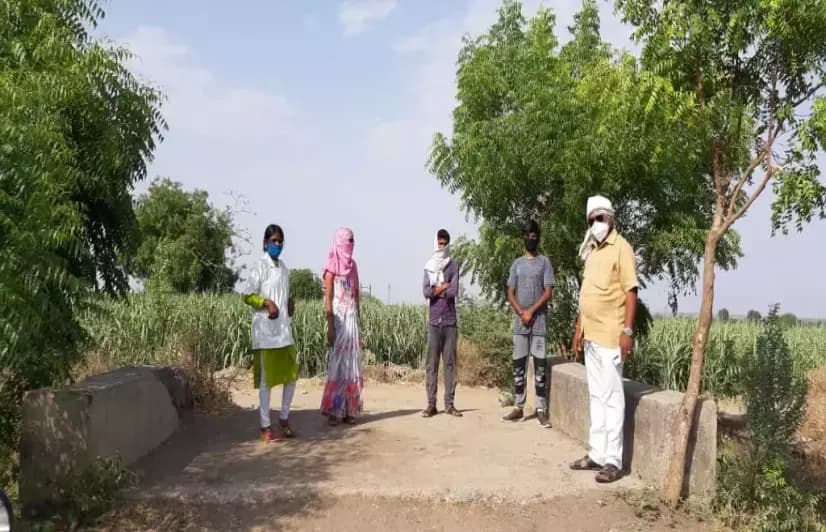Konkan still reeling under impact of cyclone Nisarga
Konkan, Maharshtra: On June 3, Cyclone Nisarg made landfall in the coastal parts of Maharashtra, leaving many people affected. Though over three months have passed, the residents along the Konkan coast have been struggling to get back to normalcy and are dependent on non-governmental organisations (NGO) for their survival. The lockdown to contain COVID-19 affected the livelihood of the resident at first, but as the lockdown was being eased, the cyclone put a damper on their efforts. The people living there claim that the state government hasn’t extended much help and even the poor beneficiaries of government programmes had to visit government offices multiple times to get any sort of assistance.People in the region state that they have no money to rebuild their houses and are dependent on NGOs from Mumbai and Pune for their survival as most of them don’t even have enough money to buy groceries.Dr Nikhil Saigaonkar, a dentist who lives in Galsure village in Raigad district, stated that his dental clinic is the only clinic between Shriwardhan and Hari Hareshwar, and people from 40 kilometres away would come to him, but his entire clinic has been destroyed by the cyclone. He mentioned that he has had to incur a loss of about Rs 14 lakh and even though he has written to the state government asking for help, he has received no assistance.A Raigad resident Datta Indurikar, who sells coconuts for a living, stated that the lockdown disrupted his business, while the cyclone destroyed his house and trees. He added that he had to move with his daughter in Kolhapur for two months as there was no power supply in his area for two months.Samadhan Naste, a resident of Umbarvira village, located near the Mumbai-Pune Expressway, stated that his makeshift home was destroyed by the pandemic and now he lives with five other people in a small establishment.“We survived on whatever was provided by the NGOs, but realised that it can’t go on forever and thought of starting a new life. Everything in the village has been destroyed, the schools, houses and shops,” he said.Community to the rescueWith the help of a few volunteers, Anish Pardeshi, a Pune-based environmentalist, has organised fundraisers to raise money for the basic needs of the affected. He mentioned that blankets, food packets and mosquito repellents have been arranged for around 500 people in the first phase and he plans on doing more.“The situation is bad, most people have no jobs and means of livelihood have been affected due to COVID-19,” he added.A Pune resident Jayesh Paranjpe, who has a travel company, has helped raise Rs 1.3 lakh to support the affected people residing in Velas village, Ratnagiri district. He mentioned that they had first set a target of Rs 50,000 to help about 40 families in the village, but as the target was achieved well before its time, he started a crowdfunding campaign, from which he collected Rs 1.3 lakh in donations.He stated that apart from the affected people, they also want to help in clearing the fallen trees.“Most of the destruction in the village was caused by the fallen trees. Hundreds of arecanut, coconut, mango and cashew trees fell and clearing these had been an uphill task for the families and the authorities. So after consulting the gram panchayat, we also decided to donate a wood cutting chainsaw to the village,” he added.Kavita Patil, sarpanch of Umbarvira village, told 101Reporters that they tried fixing the roofs of houses of the residents, but they don’t have enough funds to carry out all the work and are waiting for the release of funds from the authorities.Nidhi Chaudhary, the district collector of Raigad, stated that they are sending people to carry out repairs and are also providing groceries to the affected.

Single-handedly, teen digs trenches to store 1 cr litre water for his village
Satara, Maharashtra: To tackle the increasing water woes in the village, an 18-year-old boy from Maharashtra started an initiative to conserve water in the summer of 2018. Situated in Satara district, Gondavle village in Mann taluk faces water scarcity every year. The area also faces droughts on a regular basis.The residents of the region constantly face problems related to water. To address it, Rohit Bansode took the initiative to effectively manage the water resources available to them.Since he started, the gram panchayat has estimated that he helped conserve over 10 million litres of water. Known as the one-man army, apart from his involvement in watershed management, he has also planted over 10,000 trees and dug up a well by himself.Speaking to 101Reporters, Rohit stated the village has always faced water shortage and the district administration wasn’t doing anything to address it. “When I started digging up the land two years ago, my aim was to make a little difference in the area but there was no looking back after that day. The day I decided to do so, I replaced the books in my bag with tools used for digging,” he mentioned.He added that after working for the first two days, his hands were covered with boils and he developed a fever after working under the sun. However, he recovered and went on carrying with this initiative. His father Shankar Bansode is extremely proud of his son and stated that even though it was difficult for him initially, Rohit’s perseverance kept him going.Widespread admirationEvery day, Rohit gets up at dawn, goes to the hills and returns by 2 pm for lunch, before leaving again at 3, and returning late in the evening. In the hills, Rohit digs up the ground to conserve water with the help of Continuous Counter Trenches (CCT) technique. According to a study, CCT can be used to stop the loss of topsoil, reduce the rate of runoff, increasing percolation, recharge the groundwater level, increase the green cover over the area and soil quality and increase the availability of drinking water, agriculture development and employment. Rohit explained that CCT is useful in regions where people are forced to grow their produce on hills. The stored groundwater helped in producing yields for hundreds of people in the village, he added.Inspired by Rohit, his younger sister Rakshita, 15, also accompanies him out of concern for his well-being. Now, she has joined him and tries to plant as many trees as possible.The village sarpanch Ajit Pol told 101Reporters that the gram panchayat is usually low on funds, because of which they can’t address problems in the area. “However, Rohit’s efforts are commendable and cannot be praised enough. He, by himself, has solved the problems of thousand villagers,” he added.Ajit Devare, a resident, mentioned that the efforts taken by an 18-year-old has inspired the entire village and helped in the conservation of water.Several NGOs have now stepped forward to help Rohit and his family by helping them with seed balls and saplings from all over Maharashtra.Roshani Shah, a Mumbai-based environmental enthusiast, recently visited Rohit to extend her support and has donated hundred peepal plants.Former Maharashtra education minister Vinod Tawde has taken also cognisance of Rohit’s effort and extended his wishes to him. He added that his work is commendable and wishes that more people get inspired by him.

This Maharashtra village gives free sanitary napkin to all its women
Beed, Maharashtra: In Patoda village of Maharashtra, every woman gets a monthly supply of sanitary napkins free of cost from the gram panchayat. The beneficiaries have to dispose of the used napkins in a proper manner.The village, in Beed district, has over 2,200 women, out of which 1,000 women benefit from the scheme. Started in 2019, the gram panchayat of the village in the Marathwada region has trained the women residents to dispose of their sanitary napkins properly. For contributing towards the environment, they are being given free sanitary pads. The sarpanch Bhaskar Pere Patil stated that when he took charge about 10 years ago, he wanted to create a model village, one that is emulated by others in the country. “Back then it looked challenging and we thought of focusing on issues like providing clean water and electricity. Now no one in the village has to worry about it,” he mentioned. He said, last year, they wanted to help the women, who he mentions have been a great driving force for development and then they started this initiative. “Women are in all praise of this initiative now and wouldn’t want it otherwise. However, it was not easy to get all the women of the village to dispose of the used napkins,” he commented. Earlier, a section of women residents would use a piece of cloth during their menstrual cycle. Deepali Pere, 30, who works as a computer operator with the gram panchayat, stated that the pads are handed over by the women workers present in the anganwadi and the gram panchayat office. She added that every month, they collect the pads from the school and the warden keeps a record, whether the women have disposed of the previous pads.Another resident Sushila Shingte, 36, stated that during her teenage, she never used sanitary napkins and was entirely dependent on cloth. Later, even when she could afford the sanitary pads, she didn’t buy them because she had got used to cloth, she added. “Last year, there were sessions where the gram panchayat members and school teachers introduced us to this and since then I get my supply of pads from the panchayat itself,” she mentioned.Pranita Khedse, 20, who studies in Aurangabad, said: “I tell about this initiative to all my friends and colleagues and how they should demand the same from their authorities,” she added.The gram panchayat has also set up the sanitary pad vending machine, where visitors can get a pad for only Rs 5. Ravi Chaudhary, rural development officer of Patoda village, told 101Reporters that the gram panchayat officials had to conduct several meetings with the women of the village to convince them to take these steps. They have purchased two waste converters and those are placed in the zila parishad school where the women first dispose and then take the new sanitary napkins, he added.

Maha' industrial zones stress on hiring locals, offer higher pay, perks
Pune, Maharashtra: The reverse migration set off by the lockdown to contain the spread of COVID-19 pandemic has impacted industries in Pune, Maharashtra. Eager to start operations, industries are now paying higher wages to locals. On June 5, the Maharashtra government told the Supreme Court that they have sent 11 lakh migrant workers to their respective states. On the same day, the state government told the Bombay high court that it spent Rs 330 crore in the process. The void left by the exodus of migrant workers, mostly from states such as Uttar Pradesh, Bihar, Jharkhand, Rajasthan and West Bengal, has affected the construction sector and heavy industries, where most of the labourers were employed.Several projects in Pune have been put on hold owing to the lockdown and migration of labourers, according to the Confederation of Real Estate Developers Association of India (CREDAI). Suhas Merchant, the President of CREDAI, Pune chapter, told 101Reporters that over 5,000 construction projects in Pune, Pimpri-Chinchwad and Pune Metropolitan Region Development Authority (PMRDA) have been stalled and prolonged as most of the hired labourers have returned to their respective states. To address the vacancies, they are planning to hire 1,200-1,500 locals and train them free of cost, he added.High wagesThe labourers who would earlier earn between Rs 12,000-14,000 a month are getting paid close to Rs 20,000 now. Apart from that, the new recruits also have other incentives and free canteen facilities. Owing to the reverse migration, the Metro work at Pune and Mumbai was also affected. New recruit at Pune metro, credit: Supriya DedgaonkarHemant Sonawane, the corporate communications head of MahaMetro, told 101Reporters that in Pune, there were 2,800 labourers employed out of which only 1,600 have stayed. He estimated that the labour shortage would cause an additional delay of six months.He added that they have given instructions to labour contractors to hire locals and bring them on board by paying extra money as the work needs to be completed soon.Ganesh Dherange, a contractor who hires labourers for work at Chakan and Ranjangaon Maharashtra Industrial Development Corporation (MIDC) site, stated that the rate of wages was hiked by 25% from May. He added that now labourers demand daily payment, while it was on a monthly basis earlier.Madhav Jagtap has started working in Ranjangaon MIDC from May 15. He stated that he used to earn Rs 6,000 less even though he used to work at an automobile company in the same locality. He said he earns about Rs 20,000 now and even has free meal facilities. Shailesh Pote, who joined Carraro India Private Limited on May 17, an automotive parts company, as a labourer in Ranjangaon, Junnar Taluka, stated that earlier, contractors would prefer to recruit labourers who belonged to other states as they would work without taking leaves and were content with less pay.Now, he has received a 100% wage hike when compared to his earlier wage and also has other incentives and free meal facilities as well. Amit Zende, a Talegaon-based contractor (Pune district) who recruits labourers in Chakan, Navi Mumbai and Pimpri Chinchwad area, stated that though word-of-mouth publicity, he has been able to recruit over 300 local labourers for companies such as Tata and Mahindra.Kurkumbh MIDC, a town located near Solapur Highway, is home to more than 50 industries. The contractors are facing a tough time and are on a lookout for replacements. They are ready to pay extra to the ones who stick around.Satish Shitole, the talathi (village accountant) of Kurkumbh MIDC, stated that as people left during the lockdown, the industries started hiring people from the nearby areas. “We have now recruited people living in the nearby villages and have given them the opportunity to get onboard; this time with better pay and incentive,” he added.He mentioned that there has been a 50% wage hike in the area. Will affect consumersMore than three lakh labourers, about 70% of the total labourer workforce, working in and around Pune have left during the lockdown, mentioned deputy labour commissioner Vikas Panvelkar. Dilip Batwal, the secretary of Federation of Chakan Industries, mentioned that as thousands of migrants returned to their homes, contractors were in a fix. Then, they came up with a solution that the youth in nearby villages be trained and given jobs. “They are not only being trained but considering the need of the hour to get the work done, they are also being paid higher than what the previous migrants would be paid,” he added.Ravindra Shisve, the joint police commissioner, Pune, stated that he had tried to stop labourers from leaving, but people didn’t listen to him as their means of livelihood was hit.Shive told 101Reporters, “There were a couple of times when I went to the bus stops and requested the migrant labourers to stay and that their food and shelter would be taken care of. My motive was to prevent them from going was to cut down the risk of getting infected while travelling.”Sam Nair, a heavy industries expert working for Stewart & Mackertich Wealth Management Limited, stated that the reverse migration of the labourers has affected the heavy industries and the pace of production has slowed down.“In a country like ours, the input from labourers is extremely important and in return affects the product. The dip in the number of workers and their increased salaries is going to eventually affect the consumer and this effect will last for the two-three quarters and the commodity of prices will increase. This, however, is expected to be a short-time effect and will bounce back when the labourers return,” he commented.

Maharashtra village orders returning migrants to self-quarantine in farms
During the lockdown to contain the spread of Covid-19 pandemic, the trend of reverse migration has been prevalent. As migrants from different parts of the country return to their respective homes, several states report a spike in the number of Covid-19 cases, with migrants comprising 72% of Bihar’s positive cases. However, a village in Maharashtra has taken an extreme step to prevent the spread of coronavirus from returning villagers. In Mothiwadi village in Beed district, since the first week of May, the village administration has asked the returnees to quarantine themselves in open agricultural fields for two weeks. Until June 8, over 91 people have been asked to quarantine in the farms, according to the gram panchayat.The hot weather of the district—which has been traditionally known to have faced water crisis—added to the discomfort of quarantining villagers, who had returned to the village to escape the risk of contracting the virus. For two weeks after returning, they had to bide time under trees.Gajanan Giri, 27, a civil services aspirant studying in Pune, returned to the village on May 12 and was asked to take shelter on the small piece of a farm his family owns. He stated that the whole ordeal felt like a punishment. He could see his parents only when they would come to serve him food. “It was mentally draining for me. I was isolated in a literal manner, not like the isolation wherein a person is isolated in his room and others are still around him in the same house,” he rued. Strict implementationThe village administration was unrelenting and wouldn’t make concessions even for menstruating women or children. The men, women and children forced into this unique quarantine had no option to defecate in the open.Walkmiki Waghmare, 30, a PhD student in Aurangabad, returned to Mothiwadi on May 14, hoping that he would be safer in his village. However, when he reached, he, his wife, one-year-old daughter and nephew were asked to self-isolate in a farm. For 14 days, they had to survive in harsh conditions; his daughter was the most affected owing to the heat, he added. “While we do understand that this was done for the safety of villagers, we believe some alternative measures should have been in place,” he commented, lamenting how they had to answer nature's calls in the open.Preeti S, 29, a resident of Aurangabad, came to the village on May 6 with her husband. She mentioned that she was on her periods at that time and it had become extremely difficult for her to lie down under the scorching sun. She said she wasn’t provided with any medicines to help ease her pain. Harsh but necessary, says village headNo meals were provided by the village administration, but a medical officer was sent regularly to monitor them, and the returnees were provided with tablets to improve their immunity, according to the gram panchayat. Mothiwadi village sarpanch Avinash Gonde told 101Reporters that unlike big cities, they don’t have the facilities to treat infected people. Thus, this step was taken to ensure that people in the village don't get infected, he added. He informed that while there is a school where the people coming from cities could have been quarantined, he said people in quarantine tend not to follow the rules of isolation seriously and mingle with others.Government medical officer for Beed district, Dr Chandarani Vagare, who attended to the returnees in Mothiwadi, said no one was tested positive for Covid-19, though people complained of fever and sore throat, having been exposed to changing weather conditions. While the district administration asserts that the measures taken by the Mothiwadi village administration are wrong, they claimed not receiving any complaints about it, and thus, have taken no action. Speaking with 101Reporters, Beed district collector Rahul Rekhawar stated that after being made aware of the situation by the reporter, they will check with the village administration and ensure that the people returning to the villages are quarantined in the school.

Write For 101Reporters
Follow Us On
101 Stories Around The Web
Explore All News